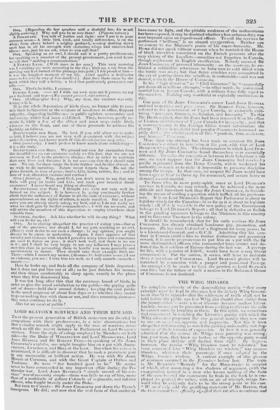have come to light, and the pitiable weakness of' the
malecontents has been exposed, it may be doubted whether a less arduous duty was • ever imposed upon an experienced officer. To call the services he performed " brilliant," is an absurd exaggeration. Neither can we concur in the Minister's praise of his super-humanity. Mr. Hume did not speak without warrant when he reminded the House of black atrocities committed on the French peasants after the easy victory of the Loyalists—atrocities not forgotten in Canada, though unpleasant to English recollection. Nobody accused Sir JOHN COLBONSE Of personal inhumanity : on the contrary, he ex- hibited a soldierliba reluctance to hang men in cold blood when the battle was over ; but that fierce cruelties were committed in the net of potting down the rebellion, is undeniable—and was not denied, even in the house of Commons.
In his high situation" as " Civil Governor," he "successfully put down all rebellions attempts,"—in other words, lie maintained martial law in Lower Canada, with a military force fully equal to the occasion. Nothing very wonderful or especially meritorious in this.
One part t f Sir Jonx Coramaane's career Lord ions RUSSELL
omitted to make ; tool ,-ruse. Sir Ronater PEEL, however, referred to ICI; gavernmeet of Upper Canada, as eminently exhi- biting " prk:.cnce, firmness, mederation, and humanity." To this Mr. Ileac replied, that Sir Jona had been removed from his office of Lieutenant-Cm:claimr of rioter Canada for ineaparity ; and that a corresp,m,lence in the Foreign Office would substantiate the charge. There is no doubt that popular discontents increased ra- pidly &she: the administration of this " prudent, firm, moderate, and humane" Governor.
More than one attempt has been made to contrast Sir Jona( CoanonsiCa cendout in remeining at his post, with that of Lord Dears `.M w! o (pitted his. The circumstances in which Lord DVII HAM BEd Sir JOHN COLBORNE found tlICIOSCIVCS were essentially difiCrent. To make the comparison between their behaviour a fair one, we must suppose that Sir June COLBORNE hal receive:1 a public reprimand from the Horse Ceards, which weakened his authority so moth as to make it impossible to preserve discipline among the troops. In that case, we suspect Sir Joni would have been carer at least to throw up his command, and return home to demand a court- martial.
To those who, in mere party-spirit, sneer at Lord Dionetais services in Canada, we may remark, that he achieved a far more difficult and important task than Sir JOHN COLBORNE, in fUrnish- ing the means of settling a question which baffled all his predeces- sors. It is on Lord Duanaat's Report that Parliament is about to legislate wisely for the Canadas—in so far as it is about to legislate wisely : till that is valuoble in the new policy of the Government belongs to Lerd DURHAM'S Report ; all that is defective or foolish in the pendia; measures belongs to the Ministers in this country and to Governor TnomsoN in the colony. It should be remembered, that for his early services Sir Jolts COLBORNE has already obtained handsome pay, promotion, and honours. Ile has been Colonel of a Regiment far many years; he is a Lieuteonnt-General, and a G.C.B. Admitting that his con- duct in Canada entitles hint to further distinction and pecuniary reward, it is surely preposterous to put him on a par with the far more distinguished officers who commanded large armies and de- feated the bust :soldiers of Europe during the last war. A peerage for life, with mm pension of 2.000/., would have been a very liberal compensatien. But the nation, it seems. will have to maintain three r•. negations of CoanousEs. Lord SEATON'S glories will be tarnished by connexion with a pauper and pensioned Peerage. An attempt will be made to limit the pension to Lord SEATON'S own life; but the titilure of such a motion in the Reformed House of Commons is not doubtful.


























 Previous page
Previous page